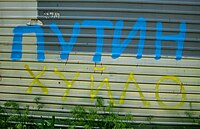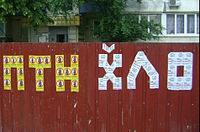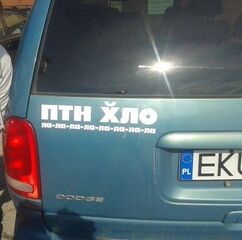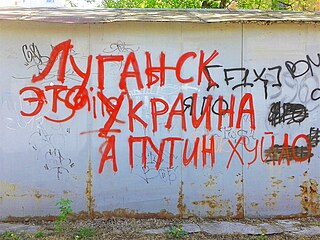Putin khuylo!
Topic: Social
 From HandWiki - Reading time: 9 min
From HandWiki - Reading time: 9 min
This article may require copy editing for grammar, style, cohesion, tone, or spelling. (March 2022) (Learn how and when to remove this template message) |
"Putin – khuylo!" (Russian: Пу́тин — хуйло́; Ukrainian: Пу́тін — хуйло́, IPA: [ˈput⁽ʲ⁾in xʊjˈlɔ]; Belarusian: Пу́цін хуйло́, IPA: [ˈput͡sʲin xujˈɫo]; commonly translated as "Putin [is a] dickhead")[1] is a slogan deriding Russian President Vladimir Putin. It originated in Ukraine in 2014 having grown from a football chant first performed by FC Metalist Kharkiv ultras and Shakhtar Donetsk ultras in March 2014 on the onset of the Russo-Ukrainian War. The phrase has become a protest song and is widely spread in Ukraine amongst supporters of Ukrainian sovereignty and territorial integrity, as well as those opposing Vladimir Putin in both Russia and Ukraine.
Etymology
The obscene term (mat) хуйло́ is variously transliterated as huilo, huylo, khuilo, khuylo, or xujlo. Its core is хуй (khuy), literally "penis", in both Russian and Ukrainian. Combined with the suffix -lo, it is a personal insult. It can be translated as "dickhead", but its connotation is far more pejorative in those languages than in English.[2] The words are identical in Russian, Ukrainian, and Belarusian.
In May 2014, media outlets reported that the Russian profanity khuilo had been added to the Urban Dictionary as a synonym for Vladimir Putin.[3][4][5][6][7]
Another abbreviation containing a similarly suggestive meaning is "ПТН ПНХ" (PTN PNKh), which stands for "Путин, пошёл на хуй" (Putin, poshol na khuy, which is similar to "Putin, go fuck yourself", which could be rendered in English as "PTN GFY").[8]
Origin
The chant has its origins in "Surkis Khuylo!", a football chant initiated by the ultras of FC Metalist Kharkiv some time in 2010, during the height of a feud between two Ukrainian oligarchs, Oleksandr Yaroslavsky, then owner of "Metalist", and Hryhoriy Surkis, then president of the Football Federation of Ukraine who had strong historic and family ties with FC Dynamo Kyiv.[9] The Kharkiv fans, who sided with their club president, chanted "Surkis Khuylo!" to express their dislike of the Football Federation president in vulgar and profane form.
The first recorded public performance of the "Putin khuylo!" chant and the song that grew from it took place in March 2014 in Kharkiv when the local fans chanted it during their street march.[10] The recording was soon posted to YouTube. Various groups of Ukrainian ultras of major Ukrainian clubs with the exception of FC Sevastopol have historically held strong pro-Ukrainian political views. These football fans sided with Ukraine at the onset of the Russian annexation of Crimea and military intervention, as well as during the pro-Russian unrest in the east and south of Ukraine, when the city of Kharkiv was in turmoil.[11][12] Soon, the song that vulgarly derided Putin gained wider popularity, spreading amongst other clubs, such as the fans of Shakhtar Donetsk (Donetsk) and Dynamo Kyiv (Kyiv), who were formerly feuding but sang the song together.[11][13] During the 2014 Russian intervention and partial occupation of Ukraine,[nb 1] the ultras of various Ukrainian clubs set aside their rivalries and chanted the song in joint street marches.[9] The chant became "a nationwide cultural meme" according to The Guardian .[17] Alexander J. Motyl reported, "A shorthand, more modest version of the lyrics has even entered the popular discourse. If you want to express your views of Putin, all you need do is say 'la-la la-la la-la', and everything's quite clear," which is a reference to the refrain of the chant.
Artemy Troitsky identified the melody of the chant[18] as coming from the song "Speedy Gonzales", popularised by American singer Pat Boone in 1962.
In June 2015, the Russian Federal Security Service started a criminal prosecution and investigation of activist Daria Poludova for using the song on VK.[19]
When Russian television channel TNT aired one episode of the Ukrainian sitcom Servant of the People in December 2019,[10] a scene containing a joke that referenced the song, in which the fictional president played by Volodymyr Zelenskyy asked "Putin hublo?" («Путин — хубло?») when told that Putin wore a Hublot watch, was cut out of the episode.[20] The omission occurred only within central Russia and the Moscow region, but not in the eastern regions of the country.[21]
Use
In music
Several Ukrainian mainstream rock music bands included or adapted the chant into their music. A metal remix, released on April 21, 2014, by AstrogentA, added instrumentation and reworked the video of the March 30 protest chant to depict its spread throughout Ukrainian football clubs.[22] The Ukrainian band Teleri (band) (uk) received international attention following the May 6, 2014 release of a song and a video titled "Putin Hello!" Their song uses a double entendre, substituting the objectionable word "khuylo" with the English word "Hello!" Alluding to the "Putin Khuylo!" chant, the video features band players wearing Ukrainian football club colors and posing as ultras marching and chanting "Putin Hello" as the refrain of the song. The band members asserted, tongue-in-cheek, that the linking of their song to an offensive anti-Putin chant was a misunderstanding and insisted that the only people who found the chant objectionable were Russians unfamiliar with English.[23]
Hromadske.TV aired a live performance of the song by Lemonchiki Project on May 29, 2014.[24] The rock band Druha Rika performed the song at their concert on June 13, 2014.[25] Other rock adaptations were made by Mad Heads[26][27] and Haydamaky.[28] The Kyiv Post reviewed nine video versions of the song and two other related songs.[29]
In sport
In October 2014, Belarusians joined visiting Ukrainians in a performance of the chant by "nearly the entire stadium" at a UEFA Euro 2016 qualifying match in Barysaw, Belarus , resulting in more than 100 Ukrainian and 30 Belarusian football fans being detained and interrogated, reportedly on suspicion of using "obscene language".[30] Seven, all Ukrainian, were sentenced to five days in jail for obscene language, whilst one was given a 10-day sentence for allegedly wearing a swastika.[31]
In the world press
The phrase received attention in the world press and was the subject of publications in influential international newspapers, magazines and numerous online publications.
In the USA
- The Washington Post .[32]
- The Wall Street Journal .[33]
- The Atlantic.[34]
- Time (magazine) .[35]
- World Affairs.
- Business Insider.[36]
- Bloomberg News .[37]
- International Business Times.[38]
- Newsweek.[39]
- Foreign Policy.
In politics
Oleh Lyashko
Oleh Lyashko, a former[40] Ukrainian MP and leader of the country's Radical Party, performed the song in May 2014 at a public rally during his 2014 presidential campaign.[41]
Andrii Deshchytsia
Hromadske.TV aired a footage showing Andrii Deshchytsia, a then Minister of Foreign Affairs of Ukraine,[1][42][43] uttering the word "khuylo" in reference to the Russian President Putin during his plea with protesters in front of the Russian Embassy in Kyiv on the evening of June 14, 2014 following the Ukrainian Air Force Ilyushin Il-76 shoot-down by the Russia-armed rebels. Deshchytsya pleaded the protesters to refrain from violence pointed at the Embassy that would cause a bigger diplomatic scandal. Deshchytsia stated: "He (Putin) is a khuylo, but - disperse, please!" Shortly afterward, Ukrainian President Petro Poroshenko nominated a different diplomat to lead the Foreign Affairs ministry.[44] According to the Ukrainian media, the presidential plan to replace the minister was known prior to the incident,[45] being proposed as part of a bigger reshuffle in the Ukrainian government. Soon after, Poroshenko praised the work of Deshchytsia, who was then leaving his ministerial position, and the parliament gave the outgoing minister a standing ovation.[46]
Deshchytsia's use of the wording caused widespread discontent amongst the Russian leadership.[1] However, Geoffrey Pyatt, the US ambassador to Ukraine, wrote on Twitter that minister Deshchytsia's use of the chant had been "seeking to defuse a dangerous situation", calling Deshchytsia "a skilled diplomat and credit to Ukraine."[1]
Arsen Avakov
On July 2, 2014, Arsen Avakov who was Ukrainian Minister of Internal Affairs, one of the country's major security agencies, published a Facebook post with a photo he took that showed a bus stop near Sloviansk covered by a "Putin Khuilo!" graffiti.[47] The minister's post included his comment to the picture saying: "A private opinion some place near Slovyansk. Aligning myself."[48] A week later, on July 9, Avakov met the troops of the Kyiv-1 Special Police force battalion. After the traditional drill exchange of "Glory to Ukraine!" greeting followed by the customary "To Heroes, Glory!" response, Avakov exclaimed "Putin!" to which the troops responded "khuylo!"[49] The minister was clearly happy with the response and gave a "Vol'no!" ("at ease!") drill command.
2022 Russian invasion of Ukraine
The phrase became popular again during the 2022 Russian invasion of Ukraine. Ukrainian brewer Yuri Zastavny began preparing glass bottles to be used for anti-Russian Molotov cocktails with the English-lettered label "Putin Huylo".[50][51]
Ukrainian hackers disabled electric vehicle charging stations in Russia so that instead of providing charge the stations display a scrolling message that includes the phrase.[52][53]
Gallery
Label with disemvoweling on car in Poland
See also
- O1G, a similar slogan targeting Viktor Orbán
- Russian warship, go fuck yourself
- Bunkerny Ded
Notes
- ↑ Russia has denied supporting the pro-Russian militia forces of the 2014 insurgency in Donbass;[14] but on 17 April 2014, Russian president Vladimir Putin admitted that Russian troops were active in Crimea during the March 2014 Crimean referendum that asked if Crimeans wanted to secede from Ukraine to join Russia, claiming this facilitated self-determination for the peninsula.[15][16]
Further reading
- Christian Diemer. Mutterlandpop. Lokale Markierung und Entgrenzung musikalischer. Darbietungen auf ukrainischen Feiertagen // Speaking in Tongues: Pop lokal global / Dietrich Helms, Thomas Phleps. — Transcript Verlag, 2015. — PP. 78–80. — 219 p. — (Beiträge zur Popularmusikforschung, Vol. 42). — ISBN:9783839432242. — ISBN:3839432243.
- Frédéric Döhl, Klaus Nathaus. Annäherungen an einen flüchtigen Gegenstand. Neue Literatur zur Geschichte der Musik aus Journalistik, Historiographie und Musikwissenschaft // Neue Politische Literatur. — 2017. — Bd. 62, Nr. 3. — S. 491.
- Taras Kuzio. Ukraine: Democratization, Corruption, and the New Russian Imperialism: Democratization, Corruption, and the New Russian Imperialism. — ABC-CLIO, 2015. — С. 112. — 641 с. — (Praeger Security International). — ISBN:9781440835032. — ISBN:1440835039.
- Oksana Havryliv. Verbale Aggression: das Spektrum der Funktionen // Linguistik Online. — 2017. — 25 Aprils (Bd. 82, H. 3). — S. 27–47. — ISSN 1615-3014. — DOI:10.13092/lo.82.3713.
References
- ↑ 1.0 1.1 1.2 1.3 "Ukraine minister's abusive remarks about Putin spark diplomatic row". The Guardian. 15 June 2014. https://www.theguardian.com/world/2014/jun/15/ukraine-minister-deshchytsia-abusive-putin-russia.
- ↑ Cole, Brendan (29 April 2022). "'Putin Huylo' Meaning as Phrase Becomes Rallying Cry for Ukraine Support". Newsweek. https://www.newsweek.com/putin-huylo-khuylo-explained-russia-ukraine-putin-language-1702063.
- ↑ "Статья Путин "huylo" появилась в американском словаре сленга" (in ru). MR7. 30 May 2014. http://www.mr7.ru/articles/102682/.
- ↑ "Благодаря песне про Путина в английском языке появилось слово "huylo"" (in ru). Vlasti.net. 17 June 2014. http://vlasti.net/news/196095.
- ↑ "Американський словник згадав Путіна, пояснюючи слово "huylo"" (in uk). Ukrayinska Pravda. 30 May 2014. http://life.pravda.com.ua/person/2014/05/30/170203/.
- ↑ "Слово Huylo вошло в словарь английского сленга Urban Dictionary" (in ru). Gazeta.ua. 29 May 2014. http://gazeta.ua/ru/articles/nelitereturna-leksika/_slovo-huylo-voshlo-v-slovar-anglijskogo-slenga-urban-dictionary/560941.
- ↑ "Путин попал в американский словарь сленга" (in ru). BelGazeta. 2 June 2014. http://www.belgazeta.by/ru/news/life/29151.
- ↑ "Украинцы не жалеют денег на именные номера "ПТН ПНХ" (фото) - Факти". 8 May 2014. http://fakty.ictv.ua/ru/index/read-news/id/1514470.
- ↑ 9.0 9.1 (in ru). Українська правда. Життя. 19 May 2014. http://life.pravda.com.ua/society/2014/05/19/168875/.
- ↑ 10.0 10.1 (in Ukrainian) The "servant of the people" in Russia: after the cut joke about Putin the series was removed from the air, Ukrayinska Pravda (11 December 2019)
- ↑ 11.0 11.1 Adam Taylor (16 June 2014). "'Khuilo': The offensive term that has attached itself to Putin". https://www.washingtonpost.com/blogs/worldviews/wp/2014/06/16/khuilo-the-offensive-term-that-has-attached-itself-to-putin/.
- ↑ "Ukraine crisis timeline". BBC News Online. 5 July 2014. https://www.bbc.co.uk/news/world-middle-east-26248275.
- ↑ Shishkin, Philip (24 May 2014). "Soccer Foes Join Forces on the Front Lines of Ukraine Crisis". The Wall Street Journal. https://online.wsj.com/news/articles/SB10001424052702303480304579581901110128642.
- ↑ "UN Conclusions Disprove Claims Against Russia Over Ukrainian Crisis - Moscow". RIA Novosti. 1 August 2014. http://en.ria.ru/world/20140801/191588991/UN-Conclusions-Disprove-Claims-Against-Russia-Over-Ukrainian.html.
- ↑ Kathy Lally (17 April 2014). "Putin's remarks raise fears of future moves against Ukraine". The Washington Post. https://www.washingtonpost.com/world/putin-changes-course-admits-russian-troops-were-in-crimea-before-vote/2014/04/17/b3300a54-c617-11e3-bf7a-be01a9b69cf1_story.html.
- ↑ "President of Russia". Eng.kremlin.ru. 1 June 2010. http://eng.kremlin.ru/news/7034.
- ↑ Alec Luhn (6 July 2014). "Donetsk becomes a ghost town as fearful residents flee conflict". The Guardian. https://www.theguardian.com/world/2014/jul/06/ukraine-crisis-donetsk.
- ↑ Ольга Бычкова (18 June 2014). "Особое мнение: Артемий Троицкий" (in ru). Echo of Moscow. http://echo.msk.ru/programs/personalno/1342200-echo/.
- ↑ Activist Darya Polyudovoy was sued for anti-Putin song (Russian) , by Novaya Gazeta, 26.06.2015
- ↑ "3 Things Russia Censored on TV in the Past Week" (in en). 2019-12-16. https://www.themoscowtimes.com/2019/12/16/3-things-russia-censored-on-tv-last-week-a68634.
- ↑ paradox (2019-12-13). "TNT cut from the TV series "servant of the people" with Zelensky's joke about "Putin — hublo"" (in en-US). http://micetimes.asia/tnt-cut-from-the-tv-series-servant-of-the-people-with-zelenskys-joke-about-putin-hublo/.
- ↑ путин - ху*ло. Украинская народная (рок-версия) on YouTube
- ↑ "Песня "Путин, hello" группы "Телери" взорвала интернет (видео)". Podrobnosti (Ukraine). 6 May 2014. http://podrobnosti.ua/kaleidoscope/2014/05/06/974698.html.
- ↑ (in ru). Big Mir. 16 June 2014. http://ivona.bigmir.net/showbiz/stars/393110-V-efire-ukrainskogo-kanala-ispolnili-znamenityj-hit-o-Putine.
- ↑ (in ru). Big Mir. 16 June 2014. http://ivona.bigmir.net/showbiz/video_old/394196-Gruppa-Druga-R-ka-predstavila-rok-versiju-znamenitogo-hita-o-Putine.
- ↑ ПТН-ХЛО от "Мед Хедс". Мотофест "Тарасова Гора - 2014 on YouTube
- ↑ ""Друга Ріка", "Mad Heads" и Кузьма Скрябин спели на концертах хит про Путина". http://myradio.ua/news/druga-rka-mad-heads-i-kuzjma-skryabin-speli-na-koncertah-hit-pro-10213250.html.
- ↑ Белорусы на рок-фестивале «Басовище» пели известный хит о Путине. Наша Ніва
- ↑ Goncharova, Olena (11 July 2014). "Kharkiv, with new anti-Russian song, becomes capital of anti-Putin music (VIDEO)". Kyiv Post. http://www.kyivpost.com/guide/music/lifestyle-blog-soccer-fans-chant-putin-khuilo-makes-it-to-world-fame-353315.html.
- ↑ "Belarus: 100 fans held for Putin song at Euro 2016 game". BBC News. 10 October 2014. https://www.bbc.com/news/blogs-news-from-elsewhere-29567246.
- ↑ Belarus: Football fans jailed for anti-Putin chant, BBC News, 10 October 2014
- ↑ "Ukrainian diplomat uses swear word for Putin, delighting protesters and angering Moscow". The washington post. 14 June 2014. https://www.washingtonpost.com/world/europe/ukrainian-diplomat-uses-swearword-for-putin/2014/06/15/53500721-b8fe-47af-b1c1-2fa0682cbd7c_story.html.
- ↑ "Soccer Foes Join Forces on the Front Lines of Ukraine Crisis". The Wall Street Journal. May 24, 2014. https://www.wsj.com/articles/SB10001424052702303480304579581901110128642.
- ↑ "'Putin Khuilo!' Ukraine's Obscene, Patriotic Rallying Cry". The Atlantic. June 18, 2014. https://www.theatlantic.com/international/archive/2014/06/putin-khuilo-ukraine-obscene-patriotic-rallying-cry/372991/.
- ↑ "A Star With a Not-So-Nice Nickname for Putin Won't Have to Change". http://time.com/2964352/vladimir-putin-huilo-star/.
- ↑ Russia Explodes At Ukraine After One Of Its Top Diplomats Called Putin A 'D—head' , Business Insider, 16.06.14
- ↑ Why Diplomats Curse About Ukraine. , Bloomberg View, 16.06.14
- ↑ Ukraine Foreign Minister Calls Russia's Vladimir Putin a 'Dickhead'. , International Business Times, 15.06.14
- ↑ 42 Football Fans Arrested After Anti-Putin Song Breaks Out in Belarus-Ukraine Match by Damien Sharkov, 10.10.14
- ↑ "Voters reject many controversial candidates in parliamentary election | KyivPost - Ukraine's Global Voice". 2019-07-22. https://www.kyivpost.com/ukraine-politics/voters-reject-many-controversial-candidates-at-parliamentary-election.html.
- ↑ "Олег Ляшко заспівав новий український хіт". YouTube. http://www.youtube.com/watch?v=a-XcoxjnEwHz4.
- ↑ Max Seddon. "Top Ukrainian Diplomat Calls Putin A "Dickhead"". BuzzFeed. https://www.buzzfeed.com/maxseddon/top-ukrainian-diplomat-calls-putin-a-dickhead.
- ↑ (in ru). News Balt. 15 June 2014. http://www.newsbalt.ru/detail/?ID=31915.
- ↑ (in ru). Vesti. 18 June 2014. http://vesti.ua/politika/57158-poroshenko-predlozhil-kandidaturu-klimkina-na-post-glavy-mid.
- ↑ "Песню украинского комментатора о Путине на YouTube посмотрели уже более полумиллиона раз" (in ru). 23 June 2014. http://nvua.net/worldcup2014/Pesnyu-ukrainskogo-kommentatora-o-Putine-na-YouTube-posmotreli-uzhe-bolee-polumilliona-raz-1244.html.
- ↑ (in uk). ICTV (Ukraine). 19 June 2014. https://www.youtube.com/watch?v=wJ4SMY8xQUk.
- ↑ "Arsen Avakov". https://www.facebook.com/arsen.avakov.1/posts/661914183898691.
- ↑ "Аваков "солидарен" с мнением, что "Путин - х*йло"". 2 July 2014. http://ru.tsn.ua/ukrayina/avakov-solidaren-s-mneniem-chto-putin-h-ylo-374651.html.
- ↑ "Военные в Славянске встретили Авакова призывом "Путин - х*йло" (видео)". 10 July 2014. http://ru.tsn.ua/politika/voennye-v-slavyanske-vstretili-avakova-prizyvom-putin-h-ylo-video-376161.html.
- ↑ "Ukrainian brewery owner making bombs instead of beer". Fox News. https://video.foxnews.com/v/6299169689001.
- ↑ "Pravda Brewery team is hand-bottling today". 26 February 2022. https://www.instagram.com/p/CacjXmHosRx/.
- ↑ Gordon, Aaron (February 28, 2022). "Russian Electric Vehicle Chargers Hacked, Tell Users 'PUTIN IS A DICKHEAD'". Vice.com. https://www.vice.com/en/article/akvya5/russian-electric-vehicle-chargers-hacked-tell-users-putin-is-a-dickhead. "AutoEnterprise's Facebook page re-posted a video taken by an Instagram user from the M11 motorway showing the disabled chargers. The chargers show an error message reading in English "CALL SERVICE NO PLUGS AVAILABLE" before new screens show additional messages in Russian: 'GLORY TO UKRAINE / GLORY TO THE HEROES / PUTIN IS A DICKHEAD / DEATH TO THE ENEMY.'"
- ↑ Goodin, Dan (February 28, 2022). "After Ukraine recruits an "IT Army," dozens of Russian sites go dark". Ars Technica. https://arstechnica.com/information-technology/2022/02/after-ukraine-recruits-an-it-army-dozens-of-russian-sites-go-dark/. "Instead of recharging vehicles, the stations displayed a message that said, among other things: 'GLORY TO UKRAINE / GLORY TO THE HEROES / PUTIN IS A DICKHEAD / DEATH TO THE ENEMY.'"
External link
 KSF
KSF







